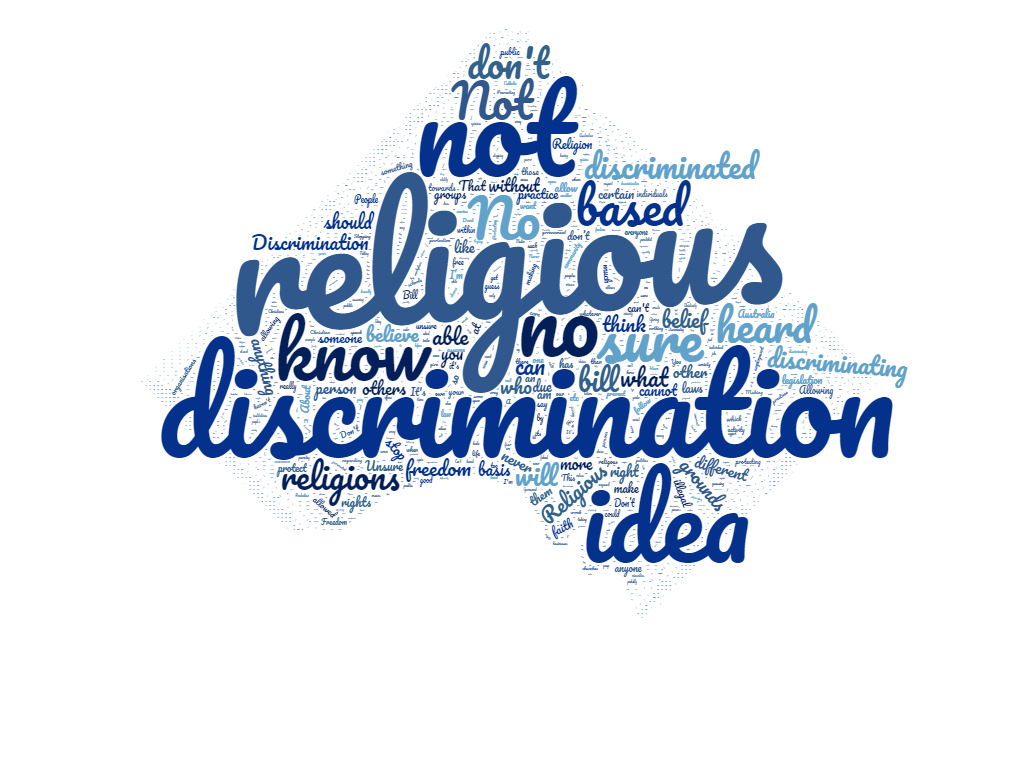


Welcome to the Australian Polity Scan, our research looking at general adult population attitudes towards topical issues across the Australian socio-political landscape, as well as regarding government performance.
This month, we have measured current levels of support and opposition regarding the Federal Government’s proposed Religious Discrimination Bill.
Recently, the Morrison Government quietly renewed its consultations towards the proposed legislation of laws protecting religious ‘freedoms’: the rights of people and organisations with faith-based values to espouse their views and practice their beliefs, even when those actions discriminate against others. The passing of such laws was a key promise in the Coalition’s 2019 election campaign.
So what do Australians think of such laws? Do they even understand what this Coalition bill proposes? With a long-standing tradition and political basis of secular democracy in the Australian polity, we think it’s important to assess just what people make of this overt intrusion of religious policy. Here, this research scan provides a quick reality check.
About this data:
Polity’s survey was conducted online between 8-11 June 2021. The sample comprises 1,592 Australian residents aged 18-74 years old, sourced from a professional research panel. The total sample has been weighted to be nationally representative by gender/age/location/education, and has an error margin of +/- 2.5% at the 95% confidence level.
Beyond an obvious understanding that it has something to do with ‘religious discrimination’, most people really have “no idea” what the bill is about

As the word cloud highlights, most people understand it has something to do with “religious discrimination”, but their understanding mostly ends there. As the word cloud also shows, the most common words associated with the bill also include don’t, no, not, know, sure and idea – as in “not sure”, “don’t know” and “no idea”.
As for the religious discrimination aspect of the bill, most opinions on what it means range between ‘allowing religious people to discriminate’ and ‘protecting religious people from discrimination’. Here are a few examples:
“Giving religious people an out to discriminate against others”
“To make it possible for people to discriminate with the excuse that it is ‘against their religion’ ”
“The way this Morrison government is going I would guess it’s about being legally able to discriminate under the guise of being a good Christian”
“Legalising religious prejudice”
“Allowing religious organisations to discriminate against people who are not of their faith”
“Religions are allowed to discriminate against people”
Or, on the other hand…
“I am assuming it would be to protect people from being discriminated against because of their religious beliefs”
“Protecting our religious freedom and ensuring people are not victimised for holding or speaking out about their religious beliefs”
“I’ve never heard of this, I assume it’s to protect freedom of religion whether it be Christianity [or] Buddhism?”
“Allowing individuals to practice their own religion without discrimination”
“Laws to prevent discrimination against people based on religious views”
“It is a law to prevent people from being persecuted because of their religious beliefs”
Australians are divided on whether to allow ‘religious freedoms’, but generally against allowing religions to discriminate
So what do people think when prompted about proposed aspects of the bill? Do they support or oppose these potential laws?
When it comes to allowing religious people or organisations to ‘voice and act on their religious beliefs’, or banning large organisations from preventing an employee from ‘expressing their religious views outside of the workplace’, the Australian polity is divided. While 41% support the first law, 30% oppose. Similarly, while 37% support the second law, 35% oppose. We might call these the Israel Folau laws, in so much as the first law would protect his views in future, and the second law would prevent an employer like Rugby Australia from gagging him.
However, when it comes to allowing religious organisations to discriminate against people, in line with faith-based values, Australians are more opposed. While 51% oppose allowing religious schools to discriminate (e.g. barring LGBTIQ+ teachers and students), and 52% oppose allowing other religious organisations to discriminate (e.g. barring LGBTIQ+ employees or customers), only 26% support either law.
Summary
Perhaps predictably, but nevertheless encouragingly, when the proposed laws are framed as ‘freedoms’, Australians are more inclined to support them. However, when the laws are framed as ‘allowing discrimination’, Australians are much more inclined to reject them. This contradiction at the heart of the Coalition’s Religious Discrimination Bill clearly illustrates how flawed it is. On the one hand, the Morrison Government is trying to ‘protect’ the values of a core part of its base, and deliver on this election promise; but to do so means legislating for discrimination – hardly a recipe for bringing the people with you.
And in case there’s any doubt this is about playing to the base, our research scan also shows that Coalition voters are more in favour of these laws, than Labor voters:
While Coalition voters clearly support the ‘freedom’ aspects of the laws, Labor voters tend to oppose them; and while Coalition voters are more divided over allowing religious-based discrimination, Labor voters are clearly opposed to such laws.
That this bill faces such opposition will come as no surprise to anyone, outside of the most committed religious fundamentalists (i.e. the Israel Folau’s of this world). Once the details of the laws reveal that the bill is mostly about legislating for discrimination, most of us clearly believe such medieval values really have no place in Australia. As one of the ‘don’t knows’ in our scan responded about what the bill meant: “Have no idea, but I think church and state should always be separate.”

